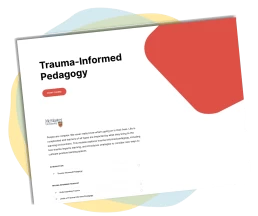
Trauma-informedpedagogy module
Originally crafted to support the development of faculty, PBL (Problem-Based Learning) tutors, and clinical placement preceptors in rehabilitation science, this module introduces trauma-informed pedagogical practices and can be applied to any course/tutorial/placement. An integrative review of the literature was originally completed via an IDEAS grant using a framework put forth by Shevrin-Venet (2021) – Predictability, Flexibility, Connection, and Empowerment.
Before you start
While we hope you can’t wait to jump in and start learning about trauma-informed pedagogy there are a few things you should know before you do:
- The module presents research in a clear and succinct way. You can expect it to take approximately 30 minutes to complete. This is an estimate and
may vary. - The module does not require any pre-existing knowledge. It has been designed for both new and experienced educators.
- You can access the module via any web browser. Downloading extra software or tools is not required.
- The module should remember your progress as you interact with it. However, if you leave the page or close your browser your progress may be
lost. If you need to come back to the module another time, make note of where you left off.
About the module
This module was designed to introduce you to the concepts of trauma-informed pedagogy, including pedagogical practices, in a quick an easy format. It contains fours sections – Introduction – understanding trauma and the limits, a case study that explores how trauma may present itself in an academic setting, trauma-informed strategies and how to apply them.
Privacy – Please note that personal information is not collected on the module website. The module was created to be accessible and equitable. If you have any questions, comments or feedback, please send a note.
Meet the Author
Sandra VanderKaay
Sandra VanderKaay is an assistant professor in the School of Rehabilitation Science and a CanChild Scientist at McMaster University. Her current program of research is focused on trauma-informed pedagogy, and clinical reasoning and ethical decision-making in occupational therapy practice, including ethical decision-making in school-based occupational therapy. Sandra’s post-doctoral fellowship at CanChild, under the supervision of Dr. Wenonah Campbell, focused on conducting realist research aimed at developing a middle-range theory of tiered rehabilitation services in education settings. Sandra completed her Ph.D. (2018) in the School of Rehabilitation Science at McMaster University under the supervision of Dr. Sandra Moll. Her thesis, titled Ethical Decision-Making in Occupational Therapy in Canada, involved three studies that looked at three distinct aspects of ethical decision-making to support occupational therapy practice. Sandra’s teaching foci include pediatric OT practice, clinical reasoning, and ethical decision-making. Sandra has been a registered occupational therapist since 1996. Her clinical background includes both school health support services and pediatric rehabilitation.
This resource shares the research of Dr. Sandra VanderKaay, McMaster University, to support educators in implementing trauma-informed pedagogy. This research was made possible through an IDEAS grant and a Fellowship in Teaching and Learning from MacPherson Institute with support from the School of Rehabilitation Sciences and the Faculty of Health Sciences.


